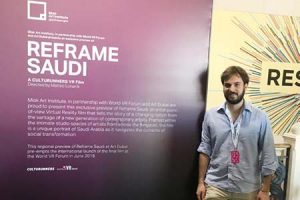The 14-minute film is an immersive depiction of a fast-evolving nation through the eyes and works of contemporary artists.

Virtual Reality film Reframe Saudi will be screened as part of World VR forums programme in Tribeca in between April 18 29 in the USA and will be launched internationally at the World VR forum in June. The 14-minute film is an immersive depiction of a fast-evolving nation through the eyes and works of contemporary artists.
Speaking to BroadcastPro ME on the sidelines of Art Dubai, where Reframe Saudi was screened as part of an initiative by the Misk Foundation, Director Matteo Lonardi said: The idea is looking at the place through artists eyes. My aim is to bring artists perspectives not just to the art audience, but the biggest audience possible. The film is not necessarily about them, but about the environment and how it influences them.
 Reframe Saudi is an intense glimpse into the evolving cultural framework in contemporary Saudi Arabia. Viewers will find themselves turning around, looking up and down into art studios, streets, mosques and deserts. Reframe Saudi features Ahmad Angawi, Dana Awartani, Rashed Al-Shashai, Ajlan Gharem, Zahra Al-Ghamdi, Ayman Yossri Daydban, Jameela Mater, Ahaad Alamoudi and Ali Mogawi working within the confines of their studios between Jeddah, Abha and Riyadh.
Reframe Saudi is an intense glimpse into the evolving cultural framework in contemporary Saudi Arabia. Viewers will find themselves turning around, looking up and down into art studios, streets, mosques and deserts. Reframe Saudi features Ahmad Angawi, Dana Awartani, Rashed Al-Shashai, Ajlan Gharem, Zahra Al-Ghamdi, Ayman Yossri Daydban, Jameela Mater, Ahaad Alamoudi and Ali Mogawi working within the confines of their studios between Jeddah, Abha and Riyadh.
An Italian photographer, film maker and VR director based in New York and London, Matteo Lonardi is originally from Milan and he graduated from the Columbia School of Journalism in 2014. Elaborating on the equipment used for the film, Lonardi said: We used a Kandao camera and many different kinds of light brands. We used Adobe Premiere for editing and DaVinci for colour correction.
 Reframe Saudi is the second VR film for Matteo, with Reframe Tehran being the first.
Reframe Saudi is the second VR film for Matteo, with Reframe Tehran being the first.
I have been looking at issues and places through the eyes of artists. This has been my theme since seven years. I used to do it through photography before moving into the VR medium, Lonardi added.
There is no commentary in Reframe Saudi and the viewer is taken through the busy markets, mosques and deserts and studios with the artists themselves making powerful statements on the conservative nature of society, the self-censorship, the urge to create and so on.
While the filmmaker was restricted to shooting the Iranian diaspora in studios outside Iran, Reframe Saudi was shot within the Kingdom.
Fortunately, I had worked with Ahmed Mater who is the director of the Misk Foundation on earlier projects. I had pitched the project to CultureRunners, an international network of artists and journalists from the Middle East, Europe and the United States, that I knew had contacts in Saudi Arabia.
Once the funding was sourced and critical contacts were made to shoot within the conservative country, Lonardi began pre-production which took a month and a half. A 12-day shoot was followed by three and a half months of post-production.
The Chinese-made camera Kandoa is a good VR camera since it is small and was easy to carry around. We brought the equipment from Italy and our crew was mostly from Milan. Care was taken with lighting and spatial sound, both critical in VR to create the sense of presence for the viewer.
Reframe Saudi is particularly skillful in its use of spatial sound that creates the all-important immersive experience.
Lonardi added: If you notice in the film you can hear sound from behind you and you turn around. The sound engineer from Milan was especially skillful in creating this effect. Post production is complex because after you get the footage and you edit it flat, then you have to stitch the scenes, remove all the tripods and other equipment.
Conceding that technology is still far from perfect, Lonardi said: We had to replace the skies, because there were issues with colour correction. There were some weird shades of magenta that needed masking. The cameras are still work-in-progress.
While Lonardi deliberately let the artists and their work tell the story, the images in Reframe Saudi are powerful juxtapositions of the traditional with the avant-garde. Strongly reflective of a society in transition, Reframe Saudi comes at a time when the Kingdom has just lifted a 35-year-old ban on cinemas as part of its Vision 2030.
Lonardi wants to push the boundaries of VR for his next film, possibly on Russia, and enter the realm of mixed reality.
What I would like to do next time is add interaction. I want the audience to be able to do things in terms of getting closer to what is happening around them.









































































